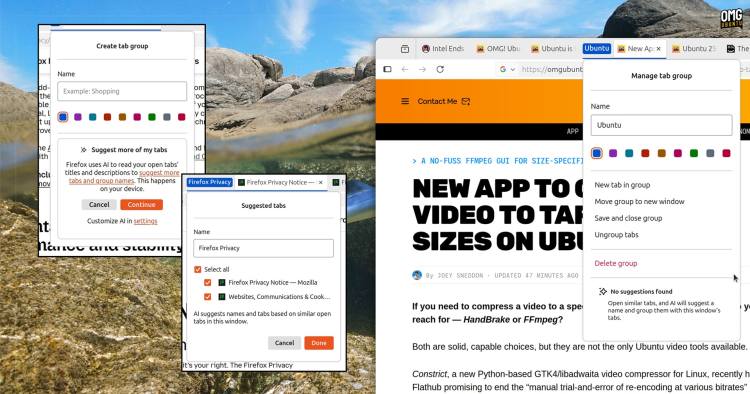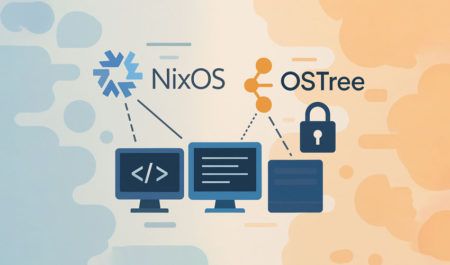Mozilla Firefox 141 serves as the latest monthly update to the famed open source browser, and adds several new features – including AI-assisted tab grouping.
This release also delivers a reduction in memory usage for Linux users, adds a handy unit converter to the address bar, and expands Picture-in-Picture support to more online streaming services.
Last month’s Firefox 140 release was a big one as it’s served as both a regular monthly release and the latest cumulative ESR snapshot for home and enterprise users who favour stability over new feature churn.
Among its features were a tab context menu entry to force unload a site from memory, easier adding of custom search engines (from any search field), listing local AI models the browser has downloaded (for built-in features) on the about:addons.
The new Firefox 141 release offers a similarly focused set of changes.
Firefox 141: What’s New?
AI-Enhanced Tab Groups
Tab grouping was added in Firefox 137 and has, in subsequent releases, improved the feature. If you want to group tabs together based on theme, task or topic, you can. Then, you can collapse the group to free up space in the tab bar.
But what if you like the idea of sorting your tabs into groups, but not the cognitive burden and manual hassle involved in doing it?
Enter Firefox 141’s AI-assisted tab groups (for some, this feature was present in Firefox 140).
This feature is able to “automatically collect your tabs into groups”, generating a name for the tab group based on inferred content, and suggest other open tabs (it thinks) match the same theme/topic.
Mozilla says automatic tab groups will “help you to stay focused, save time, and reduce clutter”. As the AI-side of the equation happens on your device no details on which tabs you’re viewing are sent to the cloud for processing.
It also says the feature may not work reliably. You may spend more time manually adding tabs to/from groups, regardless.
Unit conversion in Address Bar
Something nifty: you can use the address bar in Firefox as a unit converter (I’d wager most of us already use search engines or the GNOME Shell overview to do this).
Firefox’s unit converter supports converting units of length, temperature, mass, force, and angular measurement, and timezones. Clicking on a result in the dropdown copies it to your clipboard.
Vertical Tab Tool Resizing
Building on the vertical tab improvements in Firefox 140, this update adds a resize grip to the bottom of the sidebar. You can drag the divider to adjust how many tool icons (like AI chatbot, AI summary, history, etc) are visible, giving more vertical space to your tabs
Drag the dividing line down to hide tools in an overflow menu, or drag it up to see more of those icons on show.
Lower Memory Usage on Linux
According to the official release notes, Firefox 141 “uses less memory”, and a “forced restart” is no longer required on Linux builds after an update has been applied by a package manager.
How is it using less memory than before, and why is a forced restart no longer required? Mozilla doesn’t provide any details, so I’m not 100 percent sure. However, a sift through Bugzilla suggests it’s might be due to the addition of a “fork server“.
This new fork server address the situation when the package manager updates Firefox even though it is running, and browser trues to spawn new processes from the updated build while the old version is in memory. This is why a restart was usually required.
The fork server keeps a “pre-initialized” process ready to go (a bit like a template), which new content processes can be forked from using copy-on-write memory sharing1.
Instead of each new tab or process starting from scratch (and use more memory as a result), they share memory pages with the template process, only copying data when they need to change it. This means each process uses less memory.
More Streaming Services in PIP
Firefox 141 adds support for Peacock, SkyShowtime, Showmax, and Now TV to Picture-In-Picture (PiP) mode, along with optional formatting to captions displayed within the PiP window. If you subscribe to those services, this will be a welcome change.
Other Changes
Elsewhere, Firefox 141 enables the WebGPU API by default — but only on Windows. The Mozilla Graphics Team plan to ship WebGPU on Mac and Linux “in the coming months”, and then on Android.
WebGPU is available in Firefox Nightly builds on all platforms (apart from Android) already, so if you’re looking to test it, you don’t need to wait for it to hit stable.
Web developers may be interested to know Firefox 141 will clear the back-forward-cache when receiving the Clear-Site-Data: "cache" response header.
Besides that, some other changes:
- Pinned shortcuts on New Tab page only show pin icon on hover
- Text Fragment creation now uses a less memory-and CPU intensive algorithm
- Wayland proxy timeout increased (benefits graphics performance)
- Xdg-activation wayland protocol supported (ahead of focus changes)
- Address autofill enabled for users in Brazil, Spain and Japan
- Firefox now uses system font icons for caption buttons (Windows 11)
Plus, security fixes.
In all, this is another welcome batch of changes which both ardent fans of the free and open source web browser and those who use it begrudgingly will benefit from. Let me know what you think of this month’s feature drop by leaving a comment!
Download Firefox 141
Ubuntu user? You will be upgraded to Firefox 141 automatically, in the background, without you needing to do anything.
Linux Mint user? You can update to Firefox 141 via the Mint Update tool from July 22, as Firefox continues to be provided as a .deb package that is updated from an APT repo.
If you use Ubuntu but you don’t have Firefox installed, and want it, you have ample choices: the official Snap or Flatpak build; the Mozilla APT repo to install the Firefox DEB; and the option to download a distro-agnostic Linux binary from the Mozilla website directly.
- I think.
 ︎
︎
You’re reading Firefox 141 Adds AI Tab Grouping, Reduces Memory Use on Linux, a blog post from OMG! Ubuntu. Do not reproduce elsewhere without permission.
Source: Read More




 ︎
︎